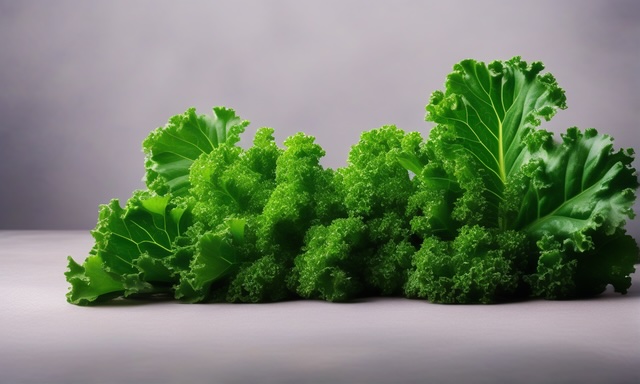Internet Asks: "Kale FODMAP"
Kale, a member of the cruciferous vegetable family, is celebrated for its dense nutritional profile, packed with vitamins, minerals, and antioxidants. However, for individuals following a low FODMAP diet due to digestive sensitivities like Irritable Bowel Syndrome (IBS), understanding the FODMAP content in kale is crucial. This article delves into kale's place within the low FODMAP diet and offers guidance for those looking to manage their digestive health without sacrificing nutrient intake.
sponsored links

Understanding FODMAPs
FODMAPs (Fermentable Oligosaccharides, Disaccharides, Monosaccharides, And Polyols) are short-chain carbohydrates that are poorly absorbed in the small intestine and can ferment in the gut, leading to symptoms such as bloating, gas, and abdominal pain in sensitive individuals. The low FODMAP diet, often recommended for IBS management, involves minimizing the intake of high FODMAP foods.
Kale: A Nutritional Overview
Kale is celebrated for its dense nutrient profile, rich in vitamins A, C, K, minerals like calcium and potassium, and antioxidants. It's a versatile vegetable that can be enjoyed raw, sautéed, or baked into chips. But where does it stand in terms of FODMAP content?
Is Kale Low FODMAP?
Kale is generally considered low in FODMAPs, making it a suitable option for those on a low-FODMAP diet. However, portion size matters. Consuming kale in large quantities may still trigger symptoms for some individuals due to its fiber content and the presence of small amounts of mannitol, a type of sugar alcohol found in some vegetables.
Incorporating Kale into a Low-FODMAP Diet
While kale can be part of a low-FODMAP diet, portion control is key. Larger servings might increase the FODMAP load, potentially triggering symptoms. Here are some tips for enjoying kale without digestive distress:
- - Portion Control: Stick to recommended serving sizes to ensure kale remains a low FODMAP choice. A serving of 1 cup (approx. 75 grams) of raw kale is considered safe for most individuals on a low FODMAP diet.
- - Cooking Methods: Cooking kale can make it easier to digest. Try steaming, sautéing, or baking kale to incorporate it into your meals gently.
- - Variety and Balance: Rotate kale with other low FODMAP greens like spinach and arugula to maintain a diverse and balanced diet.
- - Listen to Your Body: Individual tolerances vary. Pay attention to how your body reacts to kale and adjust your intake accordingly.
sponsored links
Benefits of Including Kale in Your Diet
Despite the need for portion control, incorporating kale into a low FODMAP diet can offer numerous health benefits:
- - Rich in Nutrients: Kale is a powerhouse of vitamins A, C, K, and minerals like calcium and iron.
- - Antioxidant Properties: Kale contains antioxidants such as quercetin and kaempferol, which have anti-inflammatory and heart-protective effects.
- - Dietary Fiber: While high intakes of fiber can be problematic for some with IBS, moderate amounts can aid in digestion and promote gut health.
Creative Ways to Enjoy Kale on a Low-FODMAP Diet
- - Kale Chips: Bake kale with a drizzle of olive oil and a sprinkle of sea salt for a crunchy, low-FODMAP snack.
- - Smoothies: Blend a small amount of kale with low-FODMAP fruits like strawberries or oranges for a nutritious smoothie.
- - Soups and Stews: Add kale to soups and stews for extra texture and nutrition. Cooking kale thoroughly can help make it more digestible.
Conclusion
Kale can be a beneficial addition to a low-FODMAP diet when consumed in moderation and prepared in a digestive-friendly manner. By understanding and respecting individual dietary tolerances, individuals with digestive sensitivities can enjoy the vast nutritional benefits of kale without discomfort. As with any dietary changes, it's advisable to consult with a healthcare professional or dietitian, especially when managing conditions like IBS.
Disclaimer: This article is for informational purposes only and should not be taken as medical advice. Always consult with a healthcare provider to determine the best dietary choices for your specific health needs.
sponsored links
References
1. Monash University. FODMAPs and Irritable Bowel Syndrome. https://www.monashfodmap.com/about-fodmap-and-ibs/
2. Fodmap Everyday. Kale. https://www.fodmapeveryday.com/ingredients/kale/
3. USDA FoodData Central. https://fdc.nal.usda.gov/
4. Harvard T.H. Chan School of Public Health. Vitamin C. https://www.hsph.harvard.edu/nutritionsource/vitamin-c/
5. National Institutes of Health (NIH). Vitamin C Fact Sheet. https://ods.od.nih.gov/factsheets/VitaminC-HealthProfessional/
6. WebMD. Top Foods High in Vitamin C. https://www.webmd.com/diet/foods-high-in-vitamin-c
7. Monash University. Recipes. https://www.monashfodmap.com/recipe/?page=5&search=&category=5
People are also reading...
Calories in Small Avocado
Calories Small Avocado
1 Small Avocado Calories
Calories in KFC Coleslaw
Does Gatorade Have Vitamin C?
Herbs High in Vitamin C
Sausage and Kale Pasta
Kale Lettuce
KFC Coleslaw Nutrition
Kale Slaw
KFC Coleslaw Calories
Baby Kale Nutrition
Ready to level-up?
Create meal plans 10x faster, follow up with your clients through our mobile app, and never struggle with meal planning or recipe management again.